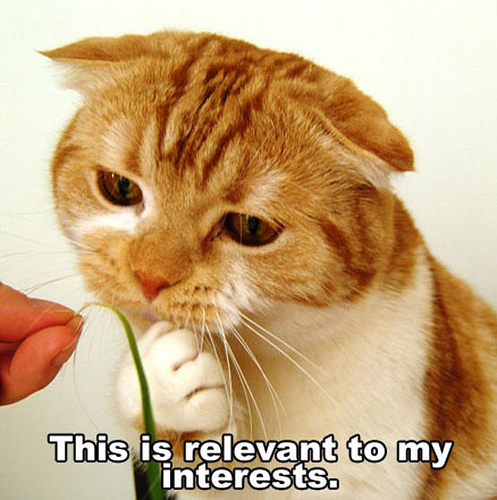Social relevance, algorithms and choice.
Apart from family and existing friends ... the interest graph is actually the primary driver behind expanding the social graph - The lines are blurring.
One of t he most important factors in social growth is discovery, discovery of posts and of people.
he most important factors in social growth is discovery, discovery of posts and of people.
Google+ was launched on the premise of being "real world sharing for the web" - it aimed to make it easier and more natural to divide our online lives into "circles" just as we are part of different groups offline (family, friends, colleagues, etc.)
Social networks afford us multiple stages of relevance management and taking Plus as an example we have:
- Circle management
- Circle volume settings
- Community membership
- relevance by association which is discovery by similar actions, posting comments to the same thread, for example)
 Control
Control
One of the most controversial and divisive aspects of Facebook is Edgerank - the algorithm used to decide what gets displayed in our news feeds based on the relationships and interactions with our friends. Essentially, our actions are analysed and we are shown more of what we "like".
Social networks such as Facebook and Google+ are cultures of affirmation where we only have the option to Like or +1, while this is intended to create a positive atmosphere it risks creating a closed loop where our feeds becoming more insular and focused.
When conditions exist such that we have multiple levels of relevance management do we need the social stream to be further filtered for us?
In response to user queries over strange stream behaviour, Google has confirmed that it is testing a relevance algorithm and "experimenting with ways of bringing the most relevant posts to the top."
The issue of control has come up before.
Engagement
Relevance engines are intended to maximise engagement - if we see things we like we are more likely to interact with them - but they can remove the opportunity for in-stream serendipitous discovery.
Is affirmation an indication of future behaviour? If I like (small 'l') an item about Jimi Hendrix today does that mean I always want to see items about Jimi Hendrix? Even if that were the case is this a zero sum game and does exposure of related content mean that other content has to be filtered out?

The introduction of Communities to Google+ put a new slant on how we manage our engagement, consumption habits and connections; they are interest based rather than people based.
Could the addition of a relevance algorithm the main stream indicate a possible shift away from people towards interest or is it intended to supplement our normal consumption highlighting the things we might have missed?
Who does it serve? The network or the user?
Conflicts
While Google have advised that problems experienced by users were due to issues with the relevance algorithm it is clear that those users are concerned about any potential changes.
Can (or should) the interest-based discovery paradigm of Communities be forced upon the main stream? Are we able to reach a state of equilibrium between serendipitous discovery and being nudged in the right direction?
Alternatively, do we have a paradox of choice where being overwhelmed with content causes us to interact less or with fewer individuals? Could a relevance engine benefit us by filtering the stream and lessening the load?
Google+, in two different respects, suffers from having a dualistic nature:
- social network v social layer, &
- people focused stream v interest focused communities
In both cases, while there is an element of cross-over, they have their own strategies, subtleties and sensibilities. We just have to remember the reaction to Community posts being included in our personal feeds - this heavily divided user opinion forcing Google to give users a choice.
 Relevance
Relevance
There is concern that the intention could be to move us away from in-stream to in-community discovery but is this the network being purely reactive to usage patterns since the introduction of Communities?
The notion of relevance based on solely on stream activity is a worry to many and we should instead ask if relevance be dynamic (platform, location, time etc.) and we should definitely have the option to apply these filters or not?
Using Google+ search as an example we are able to filter by "best of" or "most recent" - that is a user choice and should be available for the stream should any relevance algorithm be retained. Facebook's Edgerank may be divisive but we at least get a choice.
Choice
The degrees of complexity involved are immense and opinions as to how social networks should operate are as numerous as their users but two factors are paramount: choice and consistency.
We should have a choice as to what we see and where we see it and this choice should be evident wherever we are within a network.
Update: Yonatan Zunger, Google+ Chief Architect, has confirmed that no new relevance algorithm exists and that stream problems were the result of a bug. Glick's statement about bringing relevant posts to the top most likely refers to the way Circle volumes filter content.
Images by Carnie Lewis, runran, darkuncle

[...] Social relevance, algorithms and choice. (Colin Walker – Social Thoughts) [...]
[...] my previous post I discussed the implications of our social feeds being constructed based on behavioural algorithms [...]
[...] come algorithms that will only let your browser come up with things that they think you’ll like. My novel EARTH (1989) portrayed hackers in the 2020s deliberately tweaking this [...]